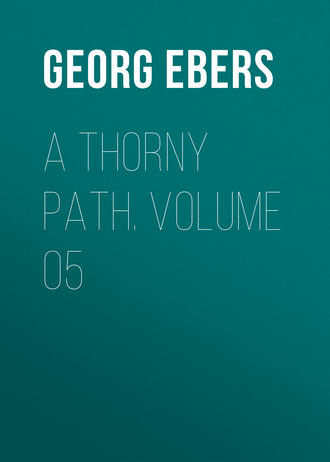
Georg Ebers
A Thorny Path. Volume 05
The lady had listened with varying feelings to this outpouring of the young girl's heart. Every instinct rebelled against the thought of sacrificing this pure, sweet creature to the fury of the tyrant whose wickedness was as unlimited as his power, and yet she saw no other chance of saving the artist, whom she held in affectionate regard. Her own noble heart understood the girl's resolve to purchase the life of those she loved, even with her blood; she, in the same place, would have done the same thing; and she thought to herself that it would have made her happy to see such a spirit in her own child. Her resistance melted away, and almost involuntarily she exclaimed, "Well, do what you feel to be right."
Melissa flew into her arms again with a grateful sense of release from a load, and Berenike did all she could to smooth the thorny way for her. She discussed every point with Philostratus as thoroughly as though for a child of her own; and, while the tumult came up from the banquet in the men's rooms, they settled that Berenike herself should conduct the girl to the wife of the high-priest of Serapis, the brother of Seleukus, and there await Melissa's return. Philostratus named the hour and other details, and then made further inquiries concerning the young artist whose mocking spirit had brought so much trouble on his family.
On this the lady led him into an adjoining room, where the portrait of her adored daughter was hanging. It was surrounded by a thick wreath of violets, the dead girl's favorite flower. The beautiful picture was lighted up by two three-branched lamps on high stands; and Philostratus, a connoisseur who had described many paintings with great taste and vividness, gazed in absorbed silence at the lovely features, which were represented with rare mastery and the inspired devotion of loving admiration. At last he turned to the mother, exclaiming:
"Happy artist, to have such a subject! It is a work worthy of the early, best period, and of a master of the time of Apelies. The daughter who has been snatched from you, noble lady, was indeed matchless, and no sorrow is too deep to do her justice. But the divinity who has taken her knows also how to give; and this portrait has preserved for you a part of what you loved. This picture, too, may influence Melissa's fate; for Caesar has a fine taste in art, and one of the wants of our time which has helped to embitter him is the paralyzed state of the imitative arts. It will be easier to win his favor for the painter who did this portrait than for a man of noble birth. He needs such painters as this Alexander for the Pinakothek in the splendid baths he has built at Rome. If you would but lend me this treasure to-morrow—"
But she interrupted him with a decisive "Never!" and laid her hand on the frame as if to protect it. Philostratus, however, was not to be put off; he went on in a tone of the deepest disappointment: "This portrait is yours, and no one can wonder at your refusal. We must, therefore, consider how to attain our end without this important ally." Berenike's gaze had lingered calmly on the sweet face while he spoke, looking more and more deeply into the beautiful, expressive features. All was silent.
At last she slowly turned to Melissa, who stood gazing sadly at the ground, and said in a low voice: "She resembled you in many ways. The gods had formed her to shed joy and light around her. Where she could wipe away a tear she always did so. Her portrait is speechless, and yet it tells me to act as she herself would have acted. If this work can indeed move Caracalla to clemency, then—You, Philostratus, really think so?"
"Yes," he replied, decisively. "There can be no better mediator for Alexander than this work." Berenike drew herself up, and said:
"Well, then, to-morrow morning early, I will send it to you at the Serapeum. The portrait of the dead may perish if it may but save the life of him who wrought it so lovingly." She turned away her face as she gave the philosopher her hand, and then hastily left the room.
Melissa flew after her and, with overflowing gratitude, besought the sobbing lady not to weep.
"I know something that will bring you greater comfort than my brother's picture: I mean the living image of your Korinna—a young girl; she is here in Alexandria."
"Zeno's daughter Agatha?" said Berenike; and when Melissa said yes, it was she, the lady went on with a deep sigh: "Thanks for your kind thought, my child; but she, too, is lost to me."
And as she spoke she sank on a couch, saying, in a low voice, "I would rather be alone."
Melissa modestly withdrew into the adjoining room, and Philostratus, who had been lost in the contemplation of the picture, took his leave.
He did not make use of the imperial chariot in waiting for him, but returned to his lodgings on foot, in such good spirits, and so well satisfied with himself, as he had not been before since leaving Rome.
When Berenike had rested in solitude for some little time she recalled Melissa, and took as much care of her young guest as though she were her lost darling, restored to her after a brief absence. First she allowed the girl to send for Argutis; and when she had assured the faithful slave that all promised well, she dismissed him with instructions to await at home his young mistress's orders, for that Melissa would for the present find shelter under her roof.
When the Gaul had departed, she desired her waiting-woman, Johanna, to fetch her brother. During her absence the lady explained to Melissa that they both were Christians. They were freeborn, the children of a freedman of Berenike's house. Johannes had at an early age shown so much intelligence that they had acceded to his wish to be educated as a lawyer. He was now one of the most successful pleaders in the city; but he always used his eloquence, which he had perfected not only at Alexandria but also at Carthage, by preference in the service of accused Christians. In his leisure hours he would visit the condemned in prison, speak comfort to them, and give them presents out of the fine profits he derived from his business among the wealthy. He was the very man to go and see her father and brothers; he would revive their spirits, and carry them her greeting.
When, presently, the Christian arrived he expressed himself as very ready to undertake this commission. His sister was already busied in packing wine and other comforts for the captives-more, no doubt, as Johannes told Berenike, than the three men could possibly consume, even if their imprisonment should be a long one. His smile showed how confidently he counted on the lady's liberality, and Melissa quickly put her faith in the young Christian, who would have reminded her of her brother Philip, but that his slight figure was more upright, and his long hair quite smooth, without a wave or curl. His eyes, above all, were unlike Philip's; for they looked out on the world with a gaze as mild as Philip's were keen and inquiring.
Melissa gave him many messages for her father and brothers, and when the lady Berenike begged him to take care that the portrait of her daughter was safely carried to the Serapeum, where it was to contribute to mollify Caesar in the painter's favor, he praised her determination, and modestly added: "For how long may we call our own any of these perishable joys? A day, perhaps a year, at most a lustrum. But eternity is long, and those who, for its sake, forget time and set all their hopes on eternity —which is indeed time to the soul—soon cease to bewail the loss of any transitory treasure, were it the noblest and dearest. Oh, would that I could lead you to place your hopes on eternity, best of women and most true-hearted mother! Eternity, which not the wisest brain can conceive of!—I tell you, lady, for you are a philosopher—that is the hardest and therefore the grandest idea for human thought to compass. Fix your eye on that, and in its infinite realm, which must be your future home, you will meet her again whom you have lost—not her image returned to you, but herself."
"Cease," interrupted the matron, with impatient sharpness. "I know what you are aiming at. But to conceive of eternity is the prerogative of the immortals; our intellect is wrecked in the attempt. Our wings melt like those of Ikarus, and we fall into the ocean—the ocean of madness, to which I have often been near enough. You Christians fancy you know all about eternity, and if you are right in that—But I will not reopen that old discussion. Give me back my child for a year, a month, a day even, as she was before murderous disease laid hands on her, and I will make you a free gift of your cuckoo-cloud-land of eternity, and of the remainder of my own life on earth into the bargain."
The vehement woman trembled with renewed sorrow, as if shivering with ague; but as soon as she had recovered her self-command enough to speak calmly, she exclaimed to the lawyer:
"I do not really wish to vex you, Johannes. I esteem you, and you are dear to me. But if you wish our friendship to continue, give up these foolish attempts to teach tortoises to fly. Do all you can for the poor prisoners; and if you—"
"By daybreak to-morrow I will be with them," Johannes said, and he hastily took leave.
As soon as they were alone Berenike observed "There he goes, quite offended, as if I had done him a wrong. That is the way with all these Christians. They think it their duty to force on others what they themselves think right, and any one who turns a deaf ear to their questionable truths they at once set down as narrow-minded, or as hostile to what is good. Agatha, of whom you were just now speaking, and Zeno her father, my husband's brother, are Christians. I had hoped that Korinna's death would have brought the child back to us; I have longed to see her, and have heard much that is sweet about her: but a common sorrow, which so often brings divided hearts together, has only widened the gulf between my husband and his brother. The fault is not on our side. Nay, I was rejoiced when, a few hours after the worst was over, a letter from Zeno informed me that he and his daughter would come to see us the same evening. But the letter itself"—and her voice began to quiver with indignation—"compelled us to beg him not to come. It is scarcely credible—and I should do better not to pour fresh oil on my wrath—but he bade us 'rejoice'; three, four, five times he repeated the cruel words. And he wrote in a pompous strain of the bliss and rapture which awaited our lost child—and this to a mother whose heart had been utterly broken but a few hours before by a fearful stroke of Fate! He would meet the bereaved, grieving, lonely mourner with a smile on his lips! Rejoice! This climax of cruelty or aberration has parted us forever. Why, our black gardener, whose god is a tree-stump that bears only the faintest likeness to humanity, melted into tears at the news; and Zeno, our brother, the uncle of that broken dower, could be glad and bid us rejoice! My husband thinks that hatred and the long-standing feud prompted his pen. For my part, I believe it was only this Christian frenzy which made him suggest that I should sink lower than the brutes, who defend their young with their lives. Seleukus has long since forgiven him for his conduct in withdrawing his share of the capital from the business when he became a Christian, to squander it on the baser sort; but this 'Rejoice' neither he nor I can forgive, though things which pierce me to the heart often slide off him like water off grease."
Her black hair had come down as she delivered this vehement speech, and, when she ceased, her flushed cheeks and the fiery glow of her eyes gave the majestic woman in her dark robes an aspect which terrified Melissa.
She, too, thought this "Rejoice," under such circumstances, unseemly and insulting; but she kept her opinion to herself, partly out of modesty and partly because she did not wish to encourage the estrangement between this unhappy lady and the niece whose mere presence would have been so great a comfort to her.
When Johanna returned to lead her to a bedroom, she gave a sigh of relief; but the lady expressed a wish to keep Melissa near her, and in a low voice desired the waiting-woman to prepare a bed for her in the adjoining room, by the side of Korinna's, which was never to be disturbed. Then, still greatly excited, she invited Melissa into her daughter's pretty room.
There she showed her everything that Korinna had especially cared for. Her bird hung in the same place; her lap-dog was sleeping in a basket, on the cushion which Berenike had embroidered for her child. Melissa had to admire the dead girl's lute, and her first piece of weaving, and the elegant loom of ebony and ivory in which she had woven it. And Berenike repeated to the girl the verses which Korinna had composed, in imitation of Catullus, on the death of a favorite bird. And although Melissa's eyes were almost closing with fatigue, she forced herself to attend to it all, for she saw now how much her sympathy pleased her kind friend.
Meanwhile the voices of the men, who had done eating and were now drinking, came louder and louder into the women's apartments. When the merriment of her guests rose to a higher pitch than usual, or something amusing gave rise to a shout of laughter, Berenike shrank, and either muttered some unintelligible threat or besought the forgiveness of her daughter's manes.
It seemed to be a relief to her to rush from one mood to the other; but neither in her grief, nor when her motherly feeling led her to talk, nor yet in her wrath, did she lose her perfect dignity. All Melissa saw and heard moved her to pity or to horror. And meanwhile she was worn out with anxiety for her family, and with increasing fatigue.
At last, however, she was released. A gay chorus of women's voices and flutes came up from the banqueting-hall. With a haughty mien and dilated nostrils Berenike listened to the first few bars. That such a song should be heard in her house of woe was too much; with her own hand she closed the shutters over the window next her; then she bade her young guest go to bed.







